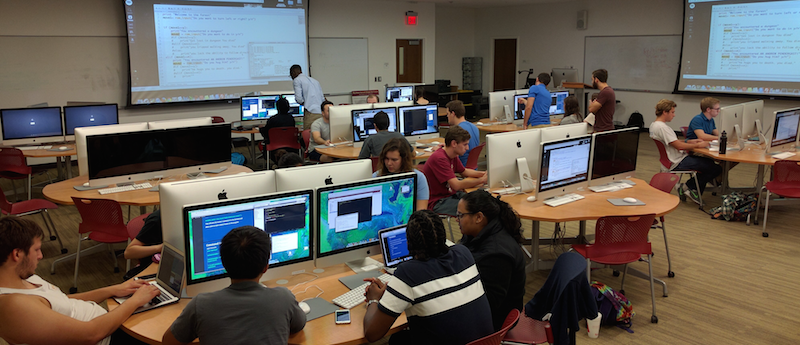Let’s face it: today’s world is becoming more and more dependent on technology. No matter what your major is or what kind of job you want to go into, chances are that you’re going to need some technological skills. Coding in particular is an important skill to have because it helps you understand what’s behind what you look at every day on your computer.
Don’t know how to code? Not to worry. Since last fall, Codeducation has been teaching FSU students who are interested in programming how to code and how to develop useful applications and software. It is a resource that gives you the tools to develop a solid coding knowledge foundation. Whether you have no experience coding or you consider yourself a coding expert, you can benefit from Codeducation.
Codeducation uses the Python programming language because it is simple and built to be readable. This helps students focus on building something new and exciting as opposed to learning and remembering syntax. In the future, Codeducation also plans to use Bootstrap, a framework that assists in the fast production and development of websites.
Codeducation President Dominic Fezzie and Vice President Joey Cardenas compare the club to a Spanish I class. They’ll give you the basic things that you need to know about coding, but it’s up to you to apply that knowledge and practice on your own.
Right now, Codeducation is focusing on member retention and appointing member educators to walk around and help out at meetings. Codeducation also has big plans for the future, such as bridging connections between participants and companies that need coders. The officers are already planning a luncheon with Feature 23, a consulting firm based in Jacksonville, Fl. They are also planning to involve other clubs to both help them bond and help educate groups about coding.
Meetings occur in seven-week blocks that build off of each other. At the beginning of each block, students are provided with the syntax they’ll need to know throughout the next seven weeks. The officers understand that attendance to weekly meeting lessons can be difficult, so they build the lessons so that missing weeks isn’t the end of the world. They will also work with members who have missed past lessons. While the officers recommend that newcomers come at the beginning of the seven-week block, newcomers are always welcome.
The group meets every Monday from 7 p.m. – 8 p.m. in WJB 2010. A new 7-week block will begin on Monday, March 14.


